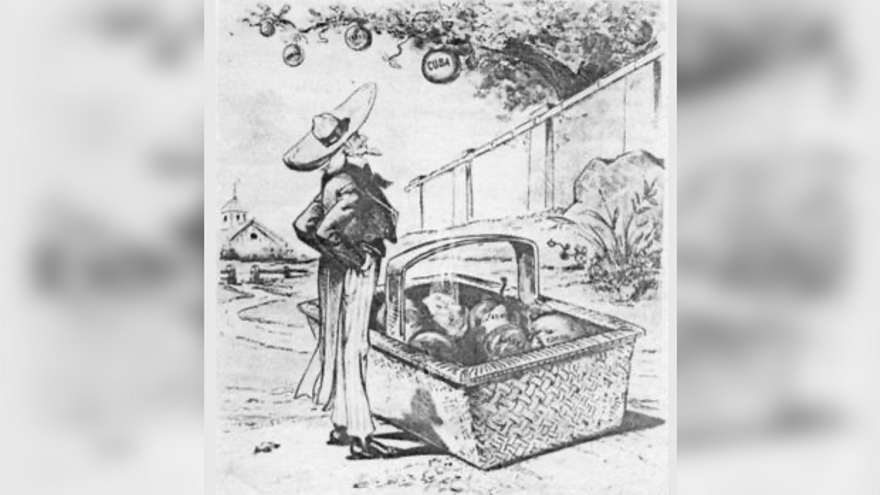
![]() 14ymedio, Yunior Garcia Aguilera, Madrid, 21 December 2023 — The Cuban regime and its ideologues have, time and again, recycled a statement made in 1823 by John Quincy Adams. The then American Secretary of State wrote about gravity, or rather about Cuba, comparing us to a fruit. He predicted that, when the island broke away from Spain, it would inevitably fall to the ground. Or, in other words, towards the U.S.
14ymedio, Yunior Garcia Aguilera, Madrid, 21 December 2023 — The Cuban regime and its ideologues have, time and again, recycled a statement made in 1823 by John Quincy Adams. The then American Secretary of State wrote about gravity, or rather about Cuba, comparing us to a fruit. He predicted that, when the island broke away from Spain, it would inevitably fall to the ground. Or, in other words, towards the U.S.
But Adams, who would later become the sixth president of the United States, never got past Isaac Newton and did not live long enough to learn about the theory of relativity. Many years later, Albert Einstein would redefine gravity, not as a force but as a deformation of space-time. And though some Granma librettists still cling to that quasi-vegan phrase, history has witnessed, on more than one occasion, space-time deformations.
If we put ourselves in his shoes, Adams words make perfect sense for someone of his time and place
If we put ourselves in his shoes, Adams words make perfect sense for someone of his time and place. Cuba enjoyed an enviably strategic position. In enemy hands, it could constitute a real threat to the United States. Our island was also the world’s largest producer of sugar, the white oil of its time. And in the coming years U.S. actions did indeed follow the “low-hanging fruit” logic, whether that meant trying to buy the island, supporting the insurgency or entering directly into the conflict with Spain, as it ultimately did.
The Teller Amendment, however, expressly prohibited eating the fruit. So what happened? Was it sudden reluctance? Fear of unfamiliar foods? In fact, not all Americans wanted this particular new star on their flag. Some were genuinely committed to our independence. Others rejected annexation because of the threat that Cuban sugar competition posed to their own businesses. And quite a few simply did it out of racism. At the time, Cuba had half a million people of African descent in a country with barely a million and a half inhabitants.
The first period of military occupation (1899-1902) has been widely studied by a broad range of historians. I personally recommend Viento Norte (North Wind) by Ignacio Uría — a sharp, intelligent, well-documented study that does not come with the embarassing Castro-Stalinist baggage that afflicts so many of our history books.
The fact is the Americans left. Years later, Cuban president Estrada Palma begged them to return. They came and left again. What was up with the fruit? This inconsistency in the American diet has confounded more than one Marxist historian. But as for the fruit, they really don’t seem to be too interested.
What John Quincy Adams never imagined was that the United States was not the only place where the apple — or, to be more tropical, mango or papaya — could fall. It took until 1959 for gravity to pull it towards Moscow. That rollercoaster of a fall was like a second Platt Amendment.
The rot in the fruit became so obvious that Fidel Castro began to see “worms” everywhere
The rot in the fruit became so obvious that Fidel Castro began to see “worms”* everywhere. He was convinced that only the Soviet cherubim could prevent the Yanks from going into full Adam-and-Eve mode on the little fruit. But the Cold War ended and the United States still showed no appetite, even though they had the opportunity to bite down hard. The balsero crisis in 1994 gave them the perfect excuse but they didn’t do it. Nor did they do it after widespread anti-government protests in July of 2021.
Some have theorized that there are those in Washington who prefer that the Cuban regime survives if for no other reason than to serve as a bad example. But one bad apple can spoil the whole bunch as we have seen in Venezuela, Nicaragua… The “defective sample” theory has been worse useless; it has been downright dangerous.
Regardless of how Washington or anyplace else sees us, we do know how important it is for us to be free. And if we have to do it on our own, we had better be realistic. Because freedom is not just about taking to the streets to celebrate and throw streamers. The country we will be inheriting is a pile of rubble.
There is much we can learn from that first transition, when the republic took its first steps. We have often looked to others such as the countries of Eastern Europe or post-Franco Spain for inspiration. But looking at ourselves can also shed a lot of light. And we must stop believing, once and for all, that we are a fruit.
*Translator’s note: “Gusanos” in Spanish, a term Castro often used in his speeches to disparage Cubans who opposed his regime.
____________
COLLABORATE WITH OUR WORK: The 14ymedio team is committed to practicing serious journalism that reflects Cuba’s reality in all its depth. Thank you for joining us on this long journey. We invite you to continue supporting us by becoming a member of 14ymedio now. Together we can continue transforming journalism in Cuba.
